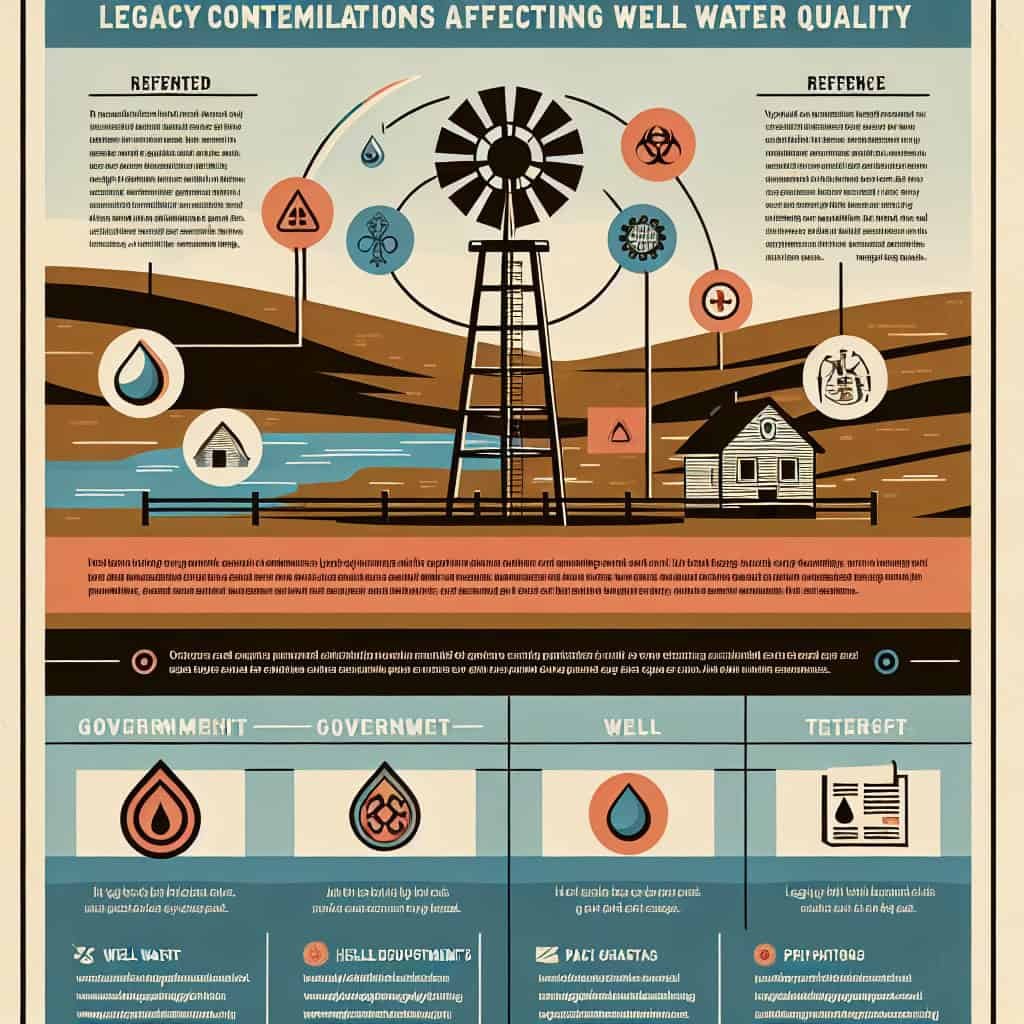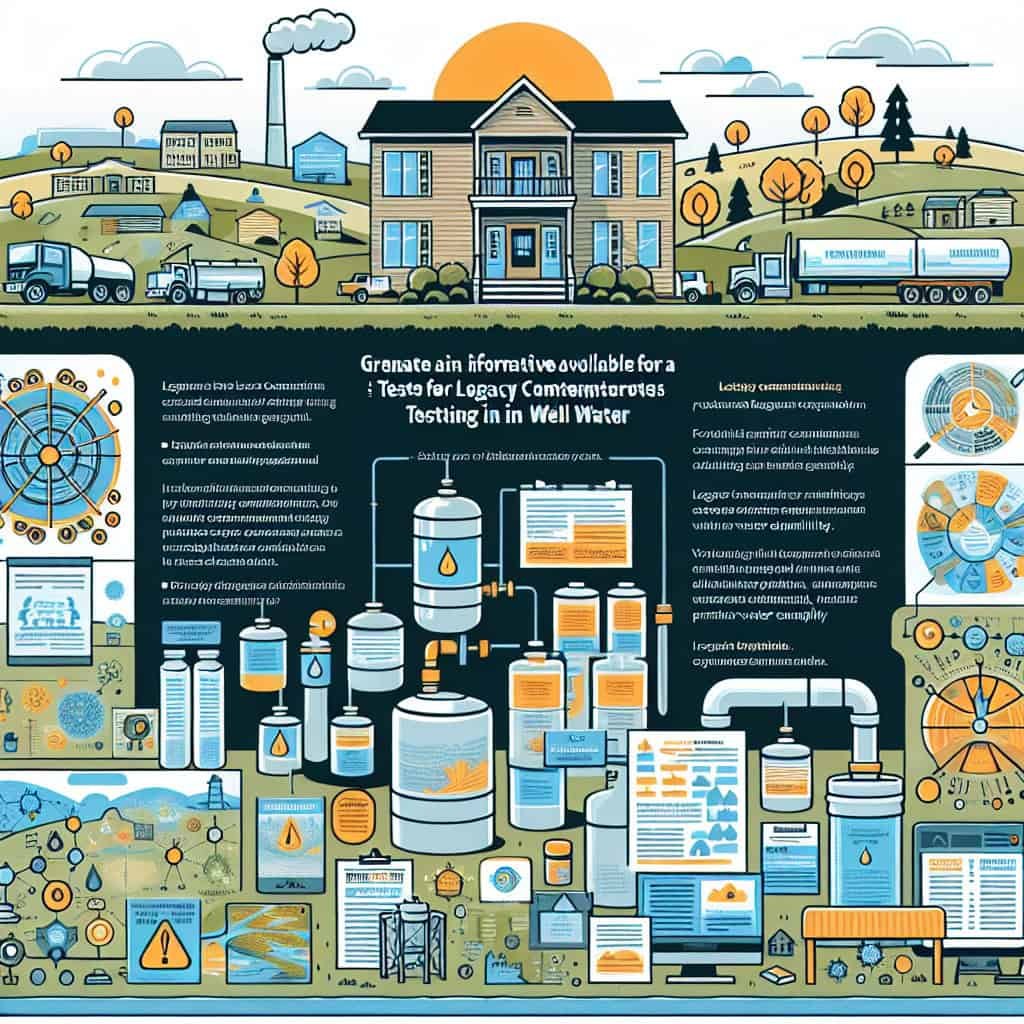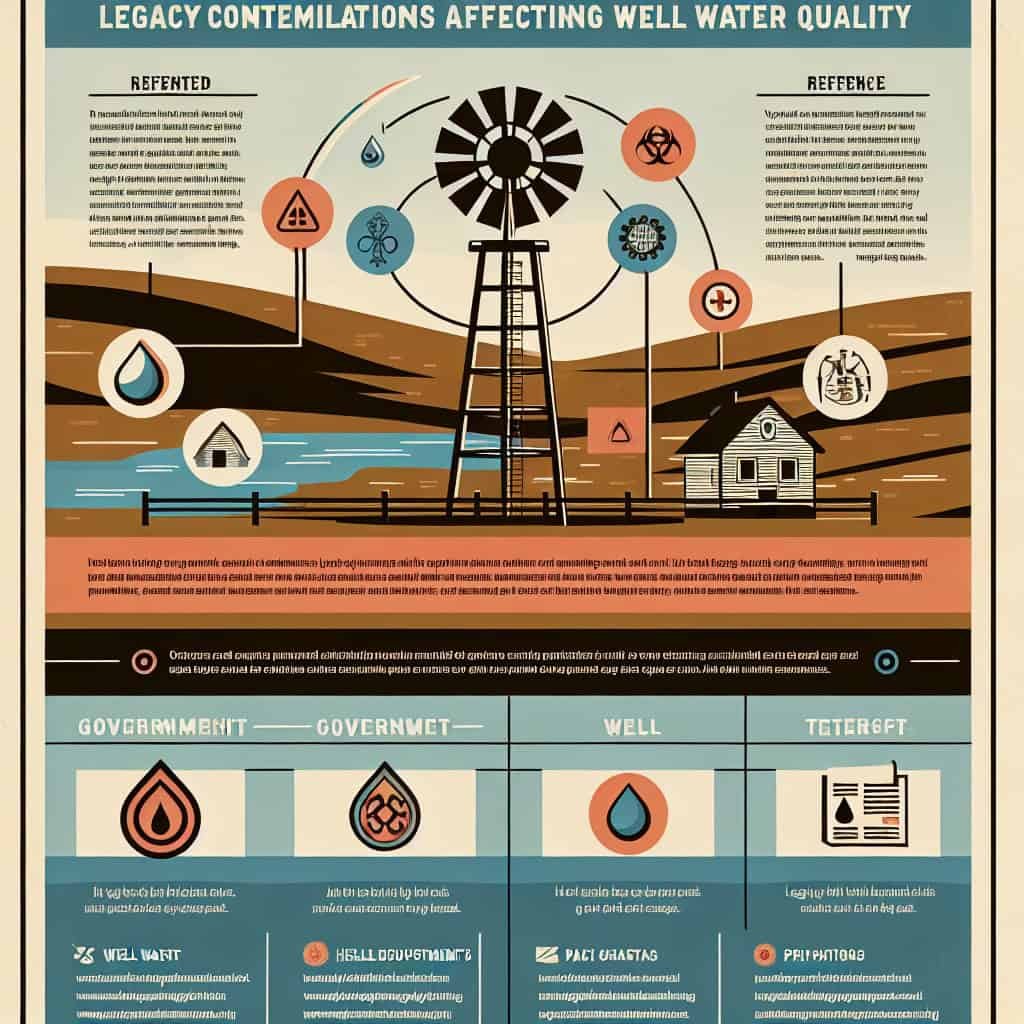If you’re a well owner and concerned about the potential presence of legacy contaminants in your well water, you may be wondering where to find reliable resources for testing. Look no further! This article aims to guide you towards the right sources that can provide valuable information and assistance for well water testing. By accessing these resources, you’ll be well-equipped to ensure the safety and quality of your water supply. So, let’s explore the various avenues available for well owners seeking to test for legacy contaminants in their well water.

Government Agencies
Environmental Protection Agency (EPA)
The Environmental Protection Agency (EPA) is a federal agency responsible for protecting human health and the environment. They play a crucial role in ensuring the safety and quality of our water supply. The EPA provides comprehensive information on well water testing and treatment methods on their website, including resources for well owners interested in testing for legacy contaminants. They offer guidance on sampling techniques, information on potential contaminants of concern, and recommendations for water treatment options if contamination is found.
Department of Health and Human Services (HHS)
The Department of Health and Human Services (HHS) is another important government agency that provides resources for well owners. Within the HHS, the Centers for Disease Control and Prevention (CDC) is especially relevant when it comes to well water testing for legacy contaminants. The CDC offers valuable guidance on waterborne diseases and their prevention. They provide information on the health risks associated with various contaminants and offer recommendations for testing and treatment. Well owners can access the CDC’s Healthy Water website to learn more about testing options and to find local resources.
Department of Agriculture (USDA)
The Department of Agriculture (USDA) also plays a role in supporting well owners interested in water testing. Specifically, their Natural Resources Conservation Service (NRCS) can provide assistance and information on water quality issues related to agriculture. They offer resources and guidance on best management practices to minimize contamination from agricultural activities. Well owners in farming communities can reach out to their local NRCS office to access these resources and to learn more about testing for legacy contaminants in their well water.
Centers for Disease Control and Prevention (CDC)
As mentioned earlier, the CDC is an essential government agency when it comes to well water testing. In addition to their resources on waterborne diseases, the CDC also provides guidance on well water testing specifically. Their website offers information on different contaminants that may be present in well water, including legacy contaminants. They outline the potential health effects of these contaminants and provide recommendations for testing frequencies and methods. Well owners can rely on the CDC for up-to-date and evidence-based information to ensure the safety of their well water.
State and Local Health Departments
State Health Departments
State health departments play a crucial role in ensuring the health and well-being of their residents, which includes monitoring and maintaining the quality of well water. They typically have dedicated divisions or programs focused on environmental health, which oversee well water testing and treatment activities. Well owners can reach out to their state health department to inquire about testing options for legacy contaminants and to access any relevant resources or guidance they provide.
County Health Departments
In addition to state health departments, county health departments also play an important role in protecting public health at the local level. They often have environmental health divisions that can provide resources and assistance to well owners. County health departments may offer water testing services themselves or refer well owners to certified testing laboratories in the area. They can also provide information on potential contaminants in the local area and offer guidance on how to address any contamination issues.
City Health Departments
City health departments, particularly in larger urban areas, may also have resources available for well owners interested in testing their well water for legacy contaminants. While many city residents may rely on municipal water supplies, there are still areas where private wells are the primary source of water. City health departments can provide information on testing options, offer guidance on interpreting test results, and help well owners navigate any potential contamination issues. It’s important for well owners in urban areas to reach out to their city health department for assistance and support.
Water Testing Laboratories
Certified Water Testing Laboratories
Certified water testing laboratories are an important resource for well owners looking to test their well water for legacy contaminants. These labs have met specific quality assurance standards and are equipped to accurately analyze water samples for a wide range of contaminants. They can provide well owners with detailed test results and data on the quality of their well water. Well owners should look for laboratories that have been certified by relevant accreditation bodies to ensure the reliability of their results.
Local Testing Labs
Local testing labs are another option for well owners seeking water testing services. These labs may be smaller in scale but still offer accurate and reliable testing for well water contaminants. Local testing labs can often provide personalized attention and guidance to well owners, helping them understand their test results and suggesting appropriate treatment options if contamination is found. Well owners can inquire with their county or city health departments for recommendations on local testing labs in their area.
Online Water Testing Services
With the advancement of technology, online water testing services have become increasingly available and convenient for well owners. These services typically provide testing kits that allow well owners to collect samples and send them back to the lab for analysis. The test results are then delivered electronically, making the process quick and efficient. Online water testing services may be particularly beneficial to well owners in remote or rural areas where access to local testing labs is limited. It’s important for well owners to ensure that the online service they choose is reputable and accredited.
University Extension Programs
Agricultural Extension Programs
University agricultural extension programs can provide valuable resources and support to well owners, especially those in rural areas where agriculture is prevalent. These programs offer research-based information and expertise on various agricultural practices, including their potential impact on water quality. Well owners can seek guidance from agricultural extension agents on minimizing contamination risks and implementing best management practices to protect well water. They may also provide information on testing options and help interpret test results.
Cooperative Extension Services
Cooperative extension services, typically operated in partnership between universities and local government entities, offer a wealth of resources for well owners. These services provide educational programs, workshops, and publications on a wide range of topics, including water quality. Well owners can attend cooperative extension events and access their materials to learn more about water testing for legacy contaminants and to stay informed about the best practices for maintaining well water quality. Cooperative extension services are an excellent local resource for well owners seeking information and support.

Nonprofit Organizations
Water Environmental Organizations
There are numerous nonprofit organizations dedicated to protecting and preserving water resources and ensuring the safety of drinking water. These organizations often provide educational materials and resources on water testing for well owners. They may offer guidance on identifying legacy contaminants, testing procedures, and treatment options. Well owners can explore these organizations’ websites and publications to access valuable information and potentially participate in workshops or events focused on water quality.
Public Health Organizations
Public health organizations also play a significant role in promoting water safety and providing resources for well owners. They may offer guidance on well water testing, including protocols for sampling and recommended testing frequencies. Public health organizations often have partnerships with government agencies and other nonprofits, allowing them to provide comprehensive information on legacy contaminants and the potential health risks associated with them. Well owners can benefit from accessing the resources and expertise offered by these organizations.
Well Owner Associations
National Well Owners Association
The National Well Owners Association (NWOA) is a valuable resource for well owners across the country. This nonprofit organization aims to promote the sustainable use and protection of groundwater resources. The NWOA offers resources on well maintenance, water testing, and treatment options. They provide educational materials, access to expert advice, and a network of fellow well owners who can share experiences and knowledge. Well owners can join the NWOA to gain access to their resources and support network.
Local Well Owner Associations
In addition to the national level, there are also well owner associations at the local level that can provide resources for well owners interested in testing for legacy contaminants. These associations often have a strong connection to the community and can offer tailored information and assistance. Local well owner associations may organize workshops, training sessions, or outreach events focused on water quality. Well owners can reach out to their local well owner association to learn about testing options, connect with other well owners, and access resources specific to their area.

Public Health Websites
CDC’s Healthy Water
The CDC’s Healthy Water website is a comprehensive online resource for well owners seeking information on water quality and testing. It offers a wealth of information on various waterborne diseases and contaminants, including legacy contaminants. Well owners can access fact sheets, guidelines, and other educational materials to learn about testing methods, interpreting test results, and potential health risks associated with contaminants. The CDC’s Healthy Water website is a trusted source of information trusted by both professionals and well owners alike.
EPA’s Drinking Water
The EPA’s Drinking Water website is another valuable resource for well owners interested in testing their well water for legacy contaminants. This website provides information on the Safe Drinking Water Act, which sets standards for public drinking water supplies. Well owners can access guidance, videos, and fact sheets on testing methods and potential contaminants. The EPA’s Drinking Water website also offers tools for locating certified laboratories and information on water treatment options. Well owners can rely on this resource to access evidence-based information and support.
Agency for Toxic Substances and Disease Registry (ATSDR)
The Agency for Toxic Substances and Disease Registry (ATSDR) is a federal agency that focuses on assessing the health risks associated with environmental contamination. They provide resources and guidance on various contaminants, including those that may be present in well water. The ATSDR offers information on testing methods, health effects of contaminants, and remediation options. Well owners can explore the ATSDR’s website to access technical resources and publications related to well water testing and legacy contaminants.
Local Universities and Colleges
Environmental Science Departments
Local universities and colleges with environmental science departments can offer valuable resources for well owners interested in testing their well water for legacy contaminants. These departments often conduct research on water quality and contamination issues, and their faculty members may have specific expertise in this area. Well owners can reach out to these departments for guidance on testing methods, sample collection procedures, and assistance with interpreting test results. Local universities are an excellent local resource for well owners seeking specialized knowledge and support.
Public Health Departments
Universities and colleges with public health departments can also provide resources for well owners interested in water testing. These departments often conduct research on waterborne diseases and contamination, including legacy contaminants. Well owners can access publications, webinars, and workshops organized by these departments to learn about potential health risks associated with well water and how to effectively test and treat it. Public health departments can also provide guidance on local testing options and connect well owners with other relevant resources in the community.

Online Resources
EPA’s Water Testing and Treatment
The EPA’s Water Testing and Treatment webpage is an online resource that offers well owners comprehensive information on testing methods and treatment options. Well owners can access guidance on selecting a laboratory, understanding test results, and interpreting water quality standards. The EPA’s website also includes information on various treatment technologies and recommendations for addressing specific contaminants. Well owners can rely on this resource to make informed decisions about their well water testing and treatment needs.
CDC’s Safe Water for Community Health (Safe WATCH)
The CDC’s Safe Water for Community Health (Safe WATCH) is an online tool that provides a wealth of resources and support for well owners. This web-based application offers guidance on sampling techniques, interpreting test results, and addressing common water quality problems. Well owners can use Safe WATCH to assess the risks associated with their well water, access educational materials, and learn about potential contaminants and their health effects. Safe WATCH is an interactive and user-friendly resource that well owners can rely on for comprehensive water testing information.
National Ground Water Association (NGWA)
The National Ground Water Association (NGWA) is a nonprofit organization that focuses on the protection and sustainable use of groundwater resources. Their website offers a wide range of resources for well owners, including information on well construction, maintenance, and testing. The NGWA provides educational materials, publications, and access to experts who can answer specific questions related to well water testing for legacy contaminants. Well owners can explore the NGWA’s website to access valuable resources and connect with a network of professionals in the field.
Local Health Clinics and Hospitals
Family Health Clinics
Local family health clinics often serve as important resources for well owners seeking information on water testing for legacy contaminants. These clinics may have healthcare professionals who are knowledgeable about water quality issues and can provide guidance on testing options, potential health risks, and treatment methods. Well owners can schedule appointments with their healthcare providers to discuss their concerns and receive personalized advice and recommendations. Family health clinics can play a vital role in ensuring the well-being of well owners and their families.
Primary Care Centers
Primary care centers, just like family health clinics, can also provide well owners with resources and support when it comes to water testing for legacy contaminants. Primary care providers can offer guidance on potential health risks associated with contaminated well water, as well as recommend appropriate testing options. They may also refer well owners to local testing laboratories or other relevant resources in the community. Primary care centers often have a holistic approach to healthcare and can provide comprehensive support for well owners concerned about their well water quality.
In conclusion, well owners interested in testing their well water for legacy contaminants have a wide range of resources available to them. Government agencies like the EPA, HHS, USDA, and CDC provide valuable information and guidance, while state and local health departments can offer local support and recommendations. Water testing laboratories, both certified and local, play a crucial role in providing accurate testing and results interpretation. University extension programs and nonprofit organizations offer educational resources and expertise, and well owner associations provide a supportive community and specific resources. Public health websites, local universities, online resources, and health clinics and hospitals all play a part in helping well owners access the information they need to ensure the safety of their well water. By utilizing these comprehensive resources, well owners can make informed decisions about testing for legacy contaminants and take the necessary steps to protect their health and the health of their families.


